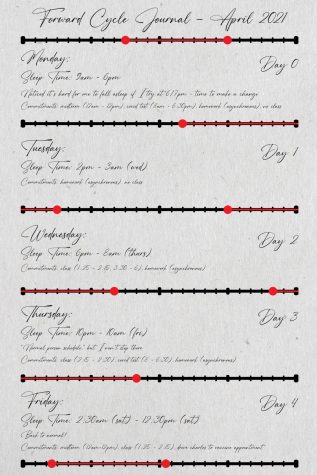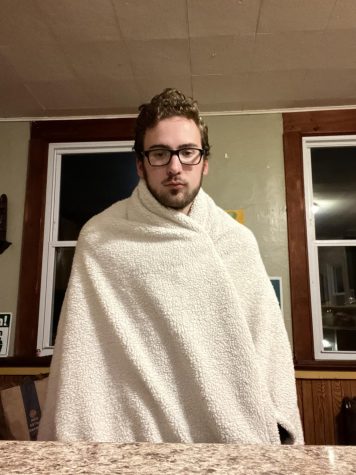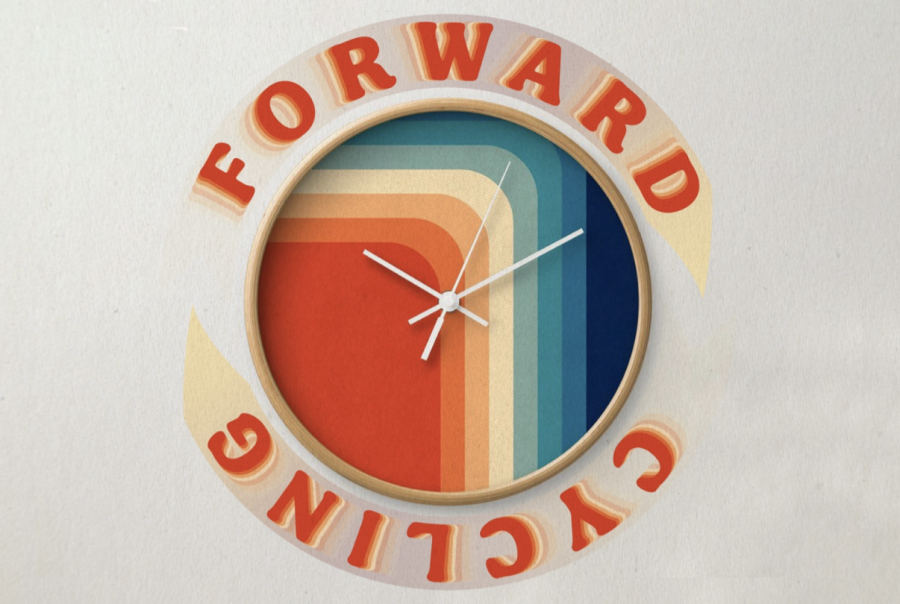Sleep is sacred to me, as it is to most functioning college students.
When I was growing up, I would sometimes end up sleeping in the same bed as someone out of necessity, sharing a mattress in hotels and on vacations. Without fail, I would end up spending all of these nights sleeping on the floor or on a chair because it somehow seemed like a better option. I think that maybe, for me, sleeping is something I needed to do alone and it was a time for me to be by myself.
This led to my main problem: I love staying up late. So much so that it often completely shifts my sleep schedule for months. Maybe having grown up with a bedtime, I always viewed post-midnight as some sort of thrilling adventure. Or maybe I enjoy the peace of knowing that everyone I know is asleep and I am completely on my own, independent and free to do what I want. Nevertheless, I have spent most of my nights since high school staying awake until around 3 a.m. at the earliest.
In the spring of 2020, I started taking this method to the extreme. We had just moved to online learning because of the pandemic. I moved back home and found that I was having trouble getting my work done on an asynchronous schedule, which most of my classes had adopted. Naturally, I started shifting my sleep schedule later and later because I could get all my work done efficiently when the rest of my family was asleep. After the semester ended, I took this idea and ran with it. My summer job was really just a bunch of odd jobs — yard work, moving furniture, etc. — which meant very flexible hours. And consequently my sleep schedule remained as nocturnal as ever. With very few commitments in the era of Covid, I was pretty successful living a nocturnal life, as long as I accounted for my daytime plans and work.
But sometimes you can’t account for everything. If some sort of event came up — “Hey, can you Zoom with me tomorrow at noon?” — I would have to function off of an insanely small amount of sleep, because at that point I was probably going to bed around 8 a.m. It became even worse if the plans were made a couple of days in advance. In those cases, I would wake up a couple of hours earlier each day to get my body acclimated to a new wake-up time.
A couple of times, it didn’t even seem feasible. If I was going to bed at 10 a.m. and waking up at 8 p.m., how would I train myself to start waking up at 1 p.m. within a couple of days? It actually sounded like torture to me. So, I devised a smarter, yet bolder strategy. Instead of spending a couple of days waking up earlier and earlier, why not do the opposite? I could achieve the same result by staying up later and later each night, but all I’d have to do is stay up late, not wake up early (and I love staying up late!). I decided to call this “forward cycling.”
Forward cycling works best when you stay up for as long as possible, while also sleeping for as long as possible, resulting in your sleep schedule being shifted forward each day until you reach a desired wake-up time. Staying up is rewarded by the ability to fall asleep easily, because you are pretty much exhausted at the end of every day. And additionally you get to sleep for as long as you like, which of course is incredibly fulfilling. When compared to the alternative (waking up early and not getting enough sleep), it sounds incredible. I’m not sure exactly when the first time I forward cycled was, but I remember it being incredibly successful, kind of fun and honestly mind-altering. If you’re still looking to be convinced, consider listening to this playlist on the subject. It’s about 12 hours long (almost one night’s sleep).

There is a strange, indescribable feeling that occurs when you stay up so late that have passed the time that your roommates, parents, etc. are waking up. To you, it’s the same day as it was yesterday, but to them it’s the start of a new day. For a moment in time to be both yesterday and tomorrow at once is paradoxical, and your mind has trouble processing this difference in time perception. I was already experiencing this somewhat by staying up late (I think my record was an 11 a.m. bedtime), but forward cycling took this experience up a notch. Because you are trying to stay awake for as long as possible, each period of time that you’re awake for keeps shifting forward. One day you might wake up at 9 p.m. and go to bed at 11 a.m., and the next you might wake up at midnight and go to bed at 3 p.m.
Living in a non-constant state like this sort of breaks your understanding of what a “day” really is. Is a day more defined by when the sun is up, or when you’re awake? If I haven’t slept in 48 hours, yes, maybe two “days” have passed, but it’s all going to feel like “today” to me. I have a vivid memory of waking up at 1 a.m., taking a shower, hanging out with my roommates for a couple of hours until they went to bed and then staying up until after they woke up. My “day” was basically their whole night, and so our understandings of that stretch of time are completely different.

One question I started having after forward cycling a couple of times: does it really matter that we are awake while the sun is up? Obviously there’s a solid argument that it’s more depressing and probably unhealthy to live without sunlight. But putting that aside, if I am living in a room without windows, I will probably be awake for 14 hours and sleep for 12, no matter if it’s day or night. It made me realize that the length of a day doesn’t exactly correspond with my needs to sleep and be awake, which is why I probably can’t be satisfied with 24 hours in a day — I’m either going to lose sleep or feel like I missed out on being awake.
I also realized that forward cycling is a lonely process. I enjoyed it because I’m a somewhat introverted person. I love watching movies, I can watch five in a row and not be bored. But for the average person, finding something to fill your day can be hard, especially if that day occurs when everyone else is asleep. And the loneliness can get real. I have definitely used forward cycling in a couple of instances where my nocturnal lifestyle felt too solitary.
I’m not writing about this to say everyone needs to experience forward cycling. But if you’re someone like me who has had trouble completely changing their sleep schedule, maybe give it a try once. It takes a couple of days, so it definitely involves some mental planning, but I find staying up late an amazing alternative to the grogginess and headache of setting an alarm.
Any hour is a reasonable hour if you have a reason.
Joey Lorant was the head graphics editor and can be reached at [email protected]. He may answer at any hour of the day.





















